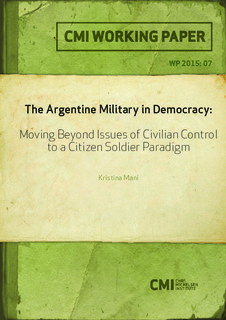The Argentine Military in Democracy: Moving Beyond Issues of Civilian Control to a Citizen Soldier Paradigm
Original version
Bergen: Chr. Michelsen Institute (CMI Working Paper WP 2015:7) 30 p.Abstract
Argentina’s transition to democracy in 1983 ended decades of cyclical military interventions in politics. Since then a long and complex process of confrontation, incorporation, and, finally, subordination has established democratic civilian control of the armed forces that is more far-reaching than anywhere else in Latin America. Civilian reformers accomplished this through a combination of force restructuring, legal restrictions on military roles, and creation of an increasingly robust defense ministry. In this context, civilian leaders since 2003 have shifted the focus of reform to resocialization of the armed forces — seeking to create “citizen soldiers” appropriate to a modern, socially progressive democracy. Thus institutional restructuring has led to efforts to promote a culture shift in the armed forces. This paper examines Argentina’s process of legal and institutional reform of the military since the 1980s, and then turns to the development of the citizen soldier model through legal, gender, and educational innovations since the mid 2000s. It finds that while this sequence of reforms is promising, bringing a citizenship model to fruition within the armed forces requires sustained commitments from civilian political leaders and civil society. In short, even the “best case” Argentine example reminds us that effective civil-military relations in contemporary democracy require both the institutions of oversight and a political culture that engages the military in the citizenship ideals of the polity.
